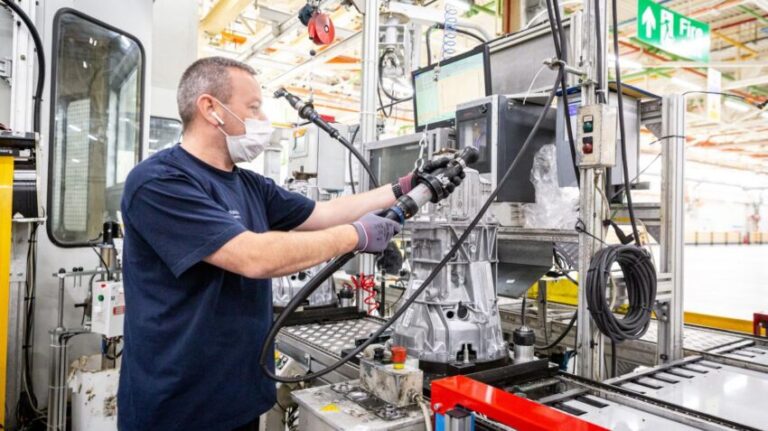[ad_1]
Falling production in the UK’s consumer goods industry dragged down output in the manufacturing sector to a seven-month low in May amid broader signs of a global economic slowdown.
Growth in Britain’s factory sector slowed last month, according to a closely watched survey, driven by global supply chain disruption, high inflation and falling new orders. An index of purchasing managers fell from 55.8 in April to 54.6 in May, in line with economist forecasts and above the 50-mark that separates growth from contraction, according to S&P and CIPS, which carries out the surveys.
Rob Dobson, director at S&P Global Market Intelligence, said manufacturing companies, which make up just under a fifth of the UK economy, were facing a “barrage of headwinds”.
“Factories are reporting a slowdown in domestic demand, falling exports, shortages of inputs and staff, rising cost pressures and heightened concern about the outlook given geopolitical uncertainties. The consumer goods sector was especially hard hit, as household demand slumped in response to the ongoing cost-of-living crisis,” Dobson said.
“Forward-looking indicators from the survey suggest that a further slowdown may be in the offing. Business optimism dipped to a 17-month low and weaker demand growth led to surplus production, meaning warehouse stock levels are rising.”
The global manufacturing sector has been hit by renewed Covid-19 lockdowns in China’s big cities hitting supply chains, and rising inflation caused by surging energy prices following the war in Ukraine. Just under half of all UK businesses reported that the prices of materials, goods or services rose between April and March, according to the Office for National Statistics.
High inflation has led to consumers switching their spending from more expensive goods to services such as tourism or leisure after lockdown restrictions were lifted, trends that have been reported in the UK and Europe.
Activity in the eurozone’s manufacturing sector fell to an 18-month low in May and registered the fourth consecutive drop in output, according to the PMI survey. The index dropped from 55.5 to 54.6 last month with new orders falling for the first time in two years. Germany’s manufacturing powerhouse was a rare exception with output rising to a two-month high of 54.8 after taking a hit from the war in Ukraine.
Inflation in the eurozone hit a fresh record of 8.1 per cent in May and businesses are passing on their higher costs to consumers. A measure of factory gate prices was the second highest ever recorded in May’s eurozone PMI.
New figures yesterday showed retail sales in Germany fell by a worse-than-expected 5.4 per cent between March and April led by the worst drop in food sales since records began.
“The eurozone economy looks increasingly and uncomfortably dependent on the service sector to sustain growth in the coming months,” Chris Williamson, chief business economist at S&P Global Market Intelligence, said.
“Spending power has hence been hit hard, and often consumers in particular have shown an eagerness to move spending from goods to services, taking advantage of looser pandemic travel restrictions.”
He said an undercurrent of uncertainty caused by the war in Ukraine and high inflation was making customers more risk-averse, “which points to deeper underlying downside risks to the outlook”.
[ad_2]
Source link























0 Comments